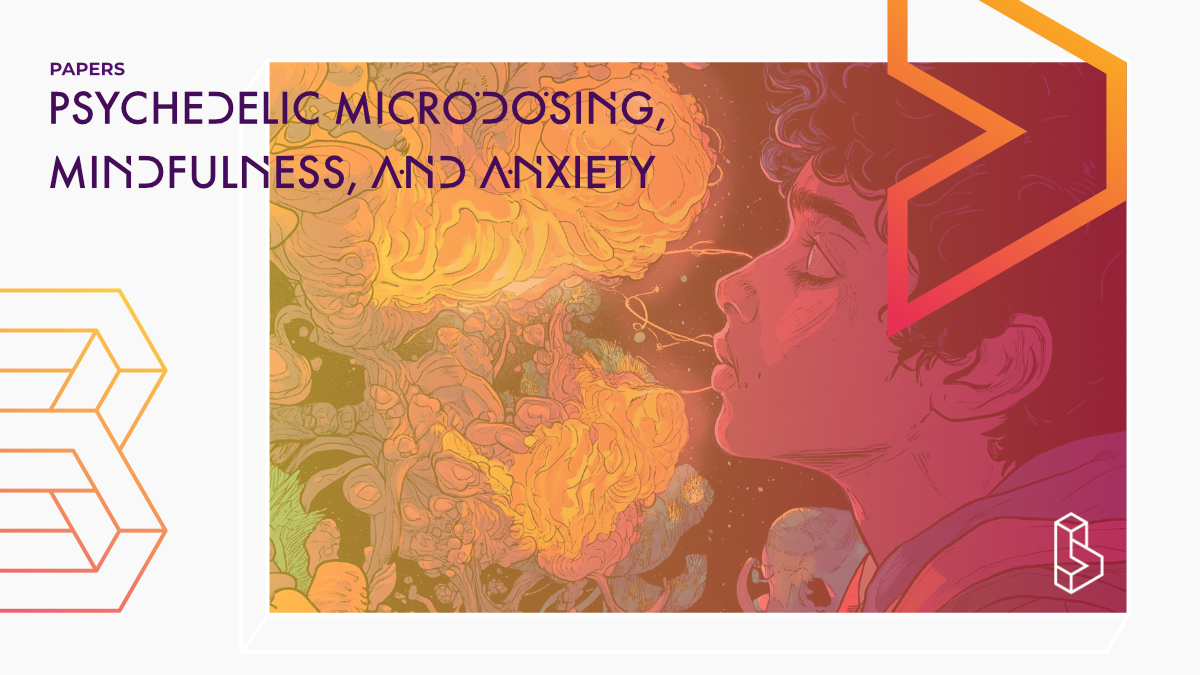This survey study assessed the relationship between microdosing and trait anxiety through an online survey with current microdosers (n=186), former microdosers (n=77) and microdosing-naïve controls (n=234). Current and former microdosers reported lower STAI-T scores compared to microdosing-naïve controls while associations of current and former microdosing with trait anxiety were mediated by trait mindfulness. All associations between microdosing and STAI-T scores became non-significant when participants with previous macrodose experience (n=386) were excluded.
Abstract of Psychedelic Microdosing, Mindfulness, and Anxiety
“While anecdotal reports claim that psychedelic microdosing reduces anxiety and mood symptoms, evidence supporting these claims is scarce. This cross-sectional study investigated the association between microdosing and trait anxiety. Furthermore, it was investigated if trait mindfulness mediated this association. Participants completed anonymous online questionnaires and were divided into three groups: current microdosers (n = 186), former microdosers (n = 77) and microdosing-naïve controls (n = 234). Trait anxiety and trait mindfulness were measured using the State-Trait Anxiety Inventory – Trait subscale (STAI-T) and the 15-item Five-Facet Mindfulness Questionnaire (FFMQ-15) respectively. Current and former microdosers reported lower STAI-T scores compared to microdosing-naïve controls. Furthermore, associations of current and former microdosing with trait anxiety were mediated by trait mindfulness, with small effects of FFMQ-15 Total, Non-judging and Non-reactivity scores. However, in an exploratory analysis, all associations between microdosing and STAI-T scores became non-significant when participants with previous macrodose experience (n = 386) were excluded. Our findings suggest that RCT<apos;>s are warranted to test causal hypotheses concerning the effects of microdosing and the role of trait mindfulness in the effects of microdosing, while controlling for previous macrodose experience.”
Authors: Vincent Hartong & Arnold van Emmerik
Summary of Psychedelic Microdosing, Mindfulness, and Anxiety
Microdosing is the practice of regularly ingesting a sub-hallucinogenic dose of a psychedelic substance, and has been reported to enhance productivity and reduce anxiety and mood symptoms. However, the effects of microdosing have been inconsistent, with some studies observing increased anxiety in microdosers compared to controls.
While the scientific evidence to support anecdotal claims concerning microdosing remains inconclusive, multiple clinical trials have investigated the effectivity of psychedelic-assisted psychotherapy for the treatment of anxiety in patients with life-threatening diseases and treatment-resistant depression.
While macrodoses have potential, they are not without risks. Microdosing may circumvent these risks entirely, as it does not induce the intense experiences that characterize a bad trip. Microdosing has been found to be effective in the treatment of anxiety and depression, and this study aimed to investigate if former microdosers report lower trait anxiety compared to microdosing-naïve controls.
Find this paper
Psychedelic Microdosing, Mindfulness, and Anxiety: A Cross-Sectional Mediation Study
https://doi.org/10.1080/02791072.2022.2080616
Paywall | Google Scholar | Backup | 🕊
Cite this paper (APA)
Hartong, V., & van Emmerik, A. (2023). Psychedelic microdosing, mindfulness, and anxiety: A cross-sectional mediation study. Journal of Psychoactive Drugs, 55(3), 310-320.

